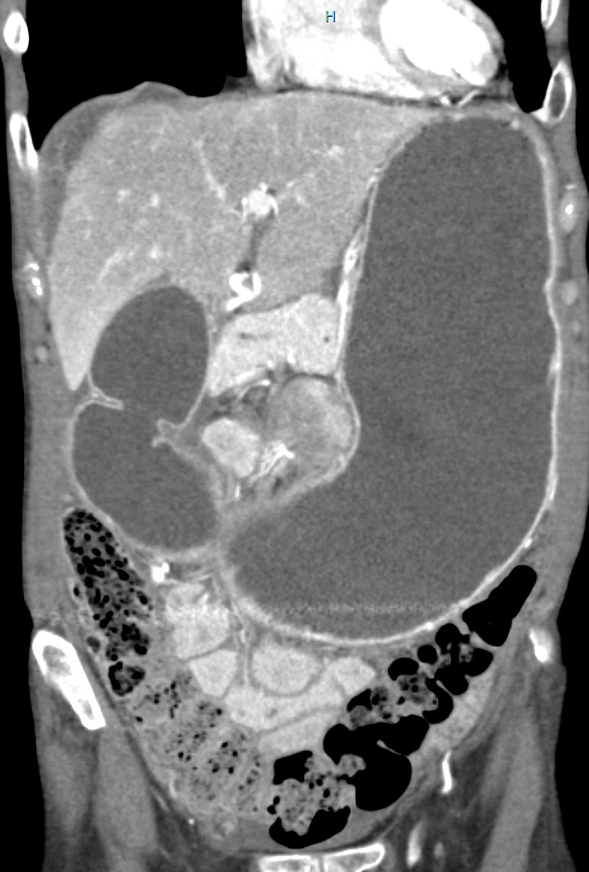Monday Poster Session
Category: Small Intestine
P4102 - Malignant Bowel Obstruction Due to Single Solitary High-Grade Serous Carcinoma of the Ovary Mimicking Mallory Weiss and Small Bowel Obstruction: A Unique Case Report
Monday, October 27, 2025
10:30 AM - 4:00 PM PDT
Location: Exhibit Hall

Riddhi Machchhar, DO (she/her/hers)
Hackensack Meridian OUMC
Brick, NJ
Presenting Author(s)
Riddhi Machchhar, DO, Ibrahim Alnasser, MD, Laith Rhabneh, MD, Ujjwala Jain, MD, Anish Kanukuntla, MD, Assif Rozovsky, MD
Hackensack Meridian OUMC, Brick, NJ
Introduction: Malignant bowel obstruction (MBO) is a rare but serious condition where a tumor blocks bowel transit, leading to high morbidity and mortality, with a 21.4% mortality rate in 2010 US hospitalizations. According to NIH SEER data, gastrointestinal and ovarian cancers are the most common malignancies associated with MBO, particularly affecting 20-50% of ovarian cancer patients. An international consensus defined MBO specifically as having clinical evidence of obstruction, being distal to the Treitz ligament, associated with cancer involvement, and lack of curative options.
Case Description/
Methods: A 61-year-old female with a history of tobacco use and teratoma excision presented with symptoms of bloating, nausea, and vomiting for 1.5 weeks. Initial complaints included epigastric burning following spicy food intake, partially relieved by esomeprazole. Her condition escalated, leading to dark brown bilious emesis and significant abdominal distension despite dietary modifications. CT imaging revealed extensive gastric and proximal duodenal distension, raising concerns of malrotation. Two EGDs noted a Mallory Weiss tear and a stenosis in the distal duodenum. Further intervention included a push enteroscopy and exploratory laparotomy, revealing high-grade carcinomatosis likely of Müllerian origin. The patient subsequently received a GJ-tube placement and ongoing TPN. She was discharged on TPN with an oncological follow-up.
Discussion: Small bowel obstruction (SBO) is primarily attributed to adhesions, while malignancy accounts for 5-20%. Malignant SBO (mSBO) typically arises from peritoneal carcinomatosis and metastatic dissemination from abdominal or pelvic tumors, resulting in either mechanical obstruction or adhesive formations. Direct invasion by primary intra-abdominal malignancies may induce obstruction, extraluminal compression, or disturb neural plexi, causing paresis and subsequent SBO. Contributing factors include prior abdominal surgeries (70%), hernias (10%), and inflammatory bowel diseases (5%). Ovarian cancer, frequently diagnosed at advanced stages, is linked to a poor prognosis, reflected in a 5-year survival rate of 30%. The diagnosis of mSBO is multifactorial and often necessitates surgical intervention. Surgical options include bypass procedures, ileostomy formation, or laparotomy; however, these approaches carry a risk of significant postoperative complications. Patients with mSBO exhibit a median survival of 117 days post-surgery compared to 49 days without surgical intervention.

Figure: CT Enterography - There is marked distention of the duodenal bulb and 2nd portion of the duodenum. Scattered mild stool seen throughout the colon. While a mass is not identified, a mass in the 3rd portion of the duodenum cannot be excluded.

Figure: Push Enteroscopy - = (a) duodenal bulb, (b) 2nd part of duodenum, (c, d) fourth portion of duodenum; Deformity appreciated in 3rd part of duodenum suspicious of narrowing/stenosis &/or mass.
Disclosures:
Riddhi Machchhar indicated no relevant financial relationships.
Ibrahim Alnasser indicated no relevant financial relationships.
Laith Rhabneh indicated no relevant financial relationships.
Ujjwala Jain indicated no relevant financial relationships.
Anish Kanukuntla indicated no relevant financial relationships.
Assif Rozovsky indicated no relevant financial relationships.
Riddhi Machchhar, DO, Ibrahim Alnasser, MD, Laith Rhabneh, MD, Ujjwala Jain, MD, Anish Kanukuntla, MD, Assif Rozovsky, MD. P4102 - Malignant Bowel Obstruction Due to Single Solitary High-Grade Serous Carcinoma of the Ovary Mimicking Mallory Weiss and Small Bowel Obstruction: A Unique Case Report, ACG 2025 Annual Scientific Meeting Abstracts. Phoenix, AZ: American College of Gastroenterology.
Hackensack Meridian OUMC, Brick, NJ
Introduction: Malignant bowel obstruction (MBO) is a rare but serious condition where a tumor blocks bowel transit, leading to high morbidity and mortality, with a 21.4% mortality rate in 2010 US hospitalizations. According to NIH SEER data, gastrointestinal and ovarian cancers are the most common malignancies associated with MBO, particularly affecting 20-50% of ovarian cancer patients. An international consensus defined MBO specifically as having clinical evidence of obstruction, being distal to the Treitz ligament, associated with cancer involvement, and lack of curative options.
Case Description/
Methods: A 61-year-old female with a history of tobacco use and teratoma excision presented with symptoms of bloating, nausea, and vomiting for 1.5 weeks. Initial complaints included epigastric burning following spicy food intake, partially relieved by esomeprazole. Her condition escalated, leading to dark brown bilious emesis and significant abdominal distension despite dietary modifications. CT imaging revealed extensive gastric and proximal duodenal distension, raising concerns of malrotation. Two EGDs noted a Mallory Weiss tear and a stenosis in the distal duodenum. Further intervention included a push enteroscopy and exploratory laparotomy, revealing high-grade carcinomatosis likely of Müllerian origin. The patient subsequently received a GJ-tube placement and ongoing TPN. She was discharged on TPN with an oncological follow-up.
Discussion: Small bowel obstruction (SBO) is primarily attributed to adhesions, while malignancy accounts for 5-20%. Malignant SBO (mSBO) typically arises from peritoneal carcinomatosis and metastatic dissemination from abdominal or pelvic tumors, resulting in either mechanical obstruction or adhesive formations. Direct invasion by primary intra-abdominal malignancies may induce obstruction, extraluminal compression, or disturb neural plexi, causing paresis and subsequent SBO. Contributing factors include prior abdominal surgeries (70%), hernias (10%), and inflammatory bowel diseases (5%). Ovarian cancer, frequently diagnosed at advanced stages, is linked to a poor prognosis, reflected in a 5-year survival rate of 30%. The diagnosis of mSBO is multifactorial and often necessitates surgical intervention. Surgical options include bypass procedures, ileostomy formation, or laparotomy; however, these approaches carry a risk of significant postoperative complications. Patients with mSBO exhibit a median survival of 117 days post-surgery compared to 49 days without surgical intervention.

Figure: CT Enterography - There is marked distention of the duodenal bulb and 2nd portion of the duodenum. Scattered mild stool seen throughout the colon. While a mass is not identified, a mass in the 3rd portion of the duodenum cannot be excluded.

Figure: Push Enteroscopy - = (a) duodenal bulb, (b) 2nd part of duodenum, (c, d) fourth portion of duodenum; Deformity appreciated in 3rd part of duodenum suspicious of narrowing/stenosis &/or mass.
Disclosures:
Riddhi Machchhar indicated no relevant financial relationships.
Ibrahim Alnasser indicated no relevant financial relationships.
Laith Rhabneh indicated no relevant financial relationships.
Ujjwala Jain indicated no relevant financial relationships.
Anish Kanukuntla indicated no relevant financial relationships.
Assif Rozovsky indicated no relevant financial relationships.
Riddhi Machchhar, DO, Ibrahim Alnasser, MD, Laith Rhabneh, MD, Ujjwala Jain, MD, Anish Kanukuntla, MD, Assif Rozovsky, MD. P4102 - Malignant Bowel Obstruction Due to Single Solitary High-Grade Serous Carcinoma of the Ovary Mimicking Mallory Weiss and Small Bowel Obstruction: A Unique Case Report, ACG 2025 Annual Scientific Meeting Abstracts. Phoenix, AZ: American College of Gastroenterology.
